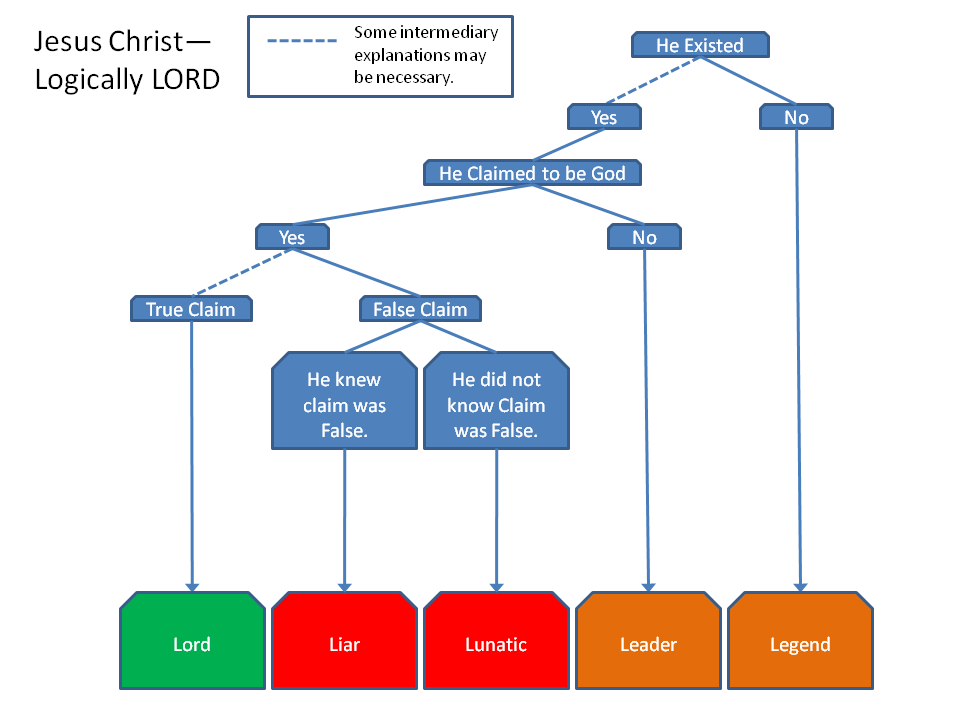The Gospel
Review of Article 7 by Greg D. Gilbert
4 May 2024
DC Yang, SR Mang
Gospel summary
- The Kingdom of God is already here
but not yet completed. - The requirements for access to this everlasting Kingdom involves the restoration of the relationship with God. The work for this has been already carried out by God, through the life and ministry of Jesus.
- What remains for us to do is to accept Jesus' role
as our Lord and Savior.
This is good news because our portion of responsibility is formally quite simple.
C.S. Lewis' trilemma

Lewis, Mere Christianity (1952).
Earlier versions also stated by Mark Hopkins (1846) and John Duncan (1859).

Background
- "gospel" from Anglo-Saxon term "godspell"
ie. "good tidings" or "good news. - Greek: εὐαγγέλιον, εὐαγγελίζω
- Believed to a translation of the Hebrew word בָּשַׂר (H1319) "to bear tidings."
- The message
- proclaimed with words
- had a definite content
- expected a response from hearers
- Misunderstood by some as anti-imperial polemic, but was intended message was the fulfillment of OT prophecies.
According to Isaiah
- Despite the apparent power of the enemy,
it is God alone who rules. - The deliverance is wholly undeserved.
God saves only by his grace.- But not without justice for the sins commited
by his people. - The punishment will be executed
on a divine servant-king. (Isaiah 53)
- But not without justice for the sins commited
According to Isaiah
- After accomplishing the salvation through death and resurrection, the risen Savior-King will "reign on David's throne" ... "with justice and righteousness from that time on and forever."
- "The poor" (H6035) in Isaiah 61 mean spiritually poor, in addition to the materially poor in Isaiah 55.
Annunciation
- Jesus' declaration at the beginning of his ministry, citing Isaiah.
"Today this scripture is fulfilled in your hearing."
[Luke 4:21] - His speech targets those who have no claim on the kingdom by right, ie. the poor.
- ... as does his healing miracles.
- But most importantly,
his speech targets the sinners.
The gospel fulfilled by Jesus
The cross
- Jesus’ death and resurrection was critical
to the good news of salvation,
ie. the event through which God provided atonement for the sins of his people. - Jesus fully understood his role in the substitutionary sacrifice of atonement.
- Note the symbolic tearing of the temple curtain.
Jesus had not just inaugurated the kingdom; he had also won forgiveness for the sin that separated people from God.
The gospel fulfilled by Jesus
Call for response
- Response = repentance (G3340:v, G3341:n)
- Occurs 34v + 22n = 56 times in NT.
- To have faith in Jesus is to trust God
as completely as Abraham did. [Romans 4:21] - Those who truly love and trust Jesus as savior
and king will turn away from sin,
keep his commandments, and follow him
even at the cost of life itself.
The gospel fulfilled by Jesus
According to Paul
- "Gospel" occurs 76 times in the NT.
60 are in the writings of Paul. - Paul insisted that he had “received [the gospel] by revelation from Jesus Christ” himself
(Gal 1:12; see 1 Cor 15:3), and therefore it was not subject to human judgment
but rather carried in itself all divine authority
(Gal 1:15–17; see Gal 1:1).
According to Paul
- Expounded in full
-
- “by the works of the law no one will be justified” (Gal 2:16)
- Sinners need “the righteousness that comes from God” (Phil 3:9) that is “apart from the law” (Rom 3:21).
- Jesus suffered in the place of sinners “as a sacrifice of atonement” (Rom 3:25) and thereby “redeemed us from the curse of the law by becoming a curse for us” (Gal 3:13).
- Sinners appropriate all this—atonement for sin and righteousness before God—by the same faith to which Abraham was credited.
Conclusions
- The NT does not try to convey anything esoteric beyond what the earliest Christians were preaching.
- Through the death and resurrection of Jesus the Messiah-King, there is righteousness, forgiveness of sin, and the inheritance of God’s kingdom for any sinner who will repent and trust in him.
Questions for discussion
- Where to draw the line between those who don't want to understand and those who are cognitively incapable of understanding the gospel?
- What are some existential dimensions to consider in the Christian gospel?
ABI Article 7 review
By ChangMo “David” Yang
ABI Article 7 review
Review of The Gospel by G.D. Gilbert
- 25



